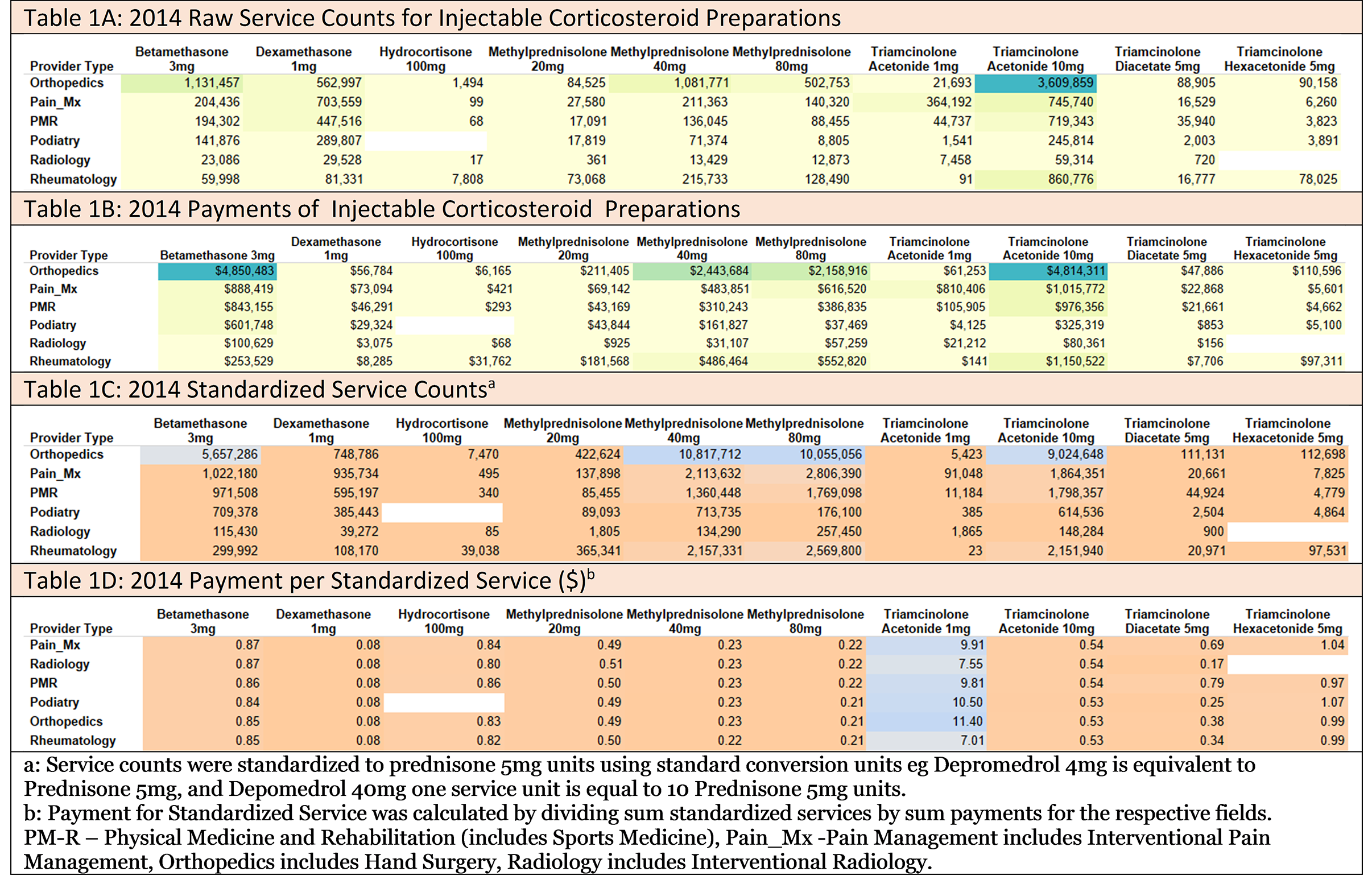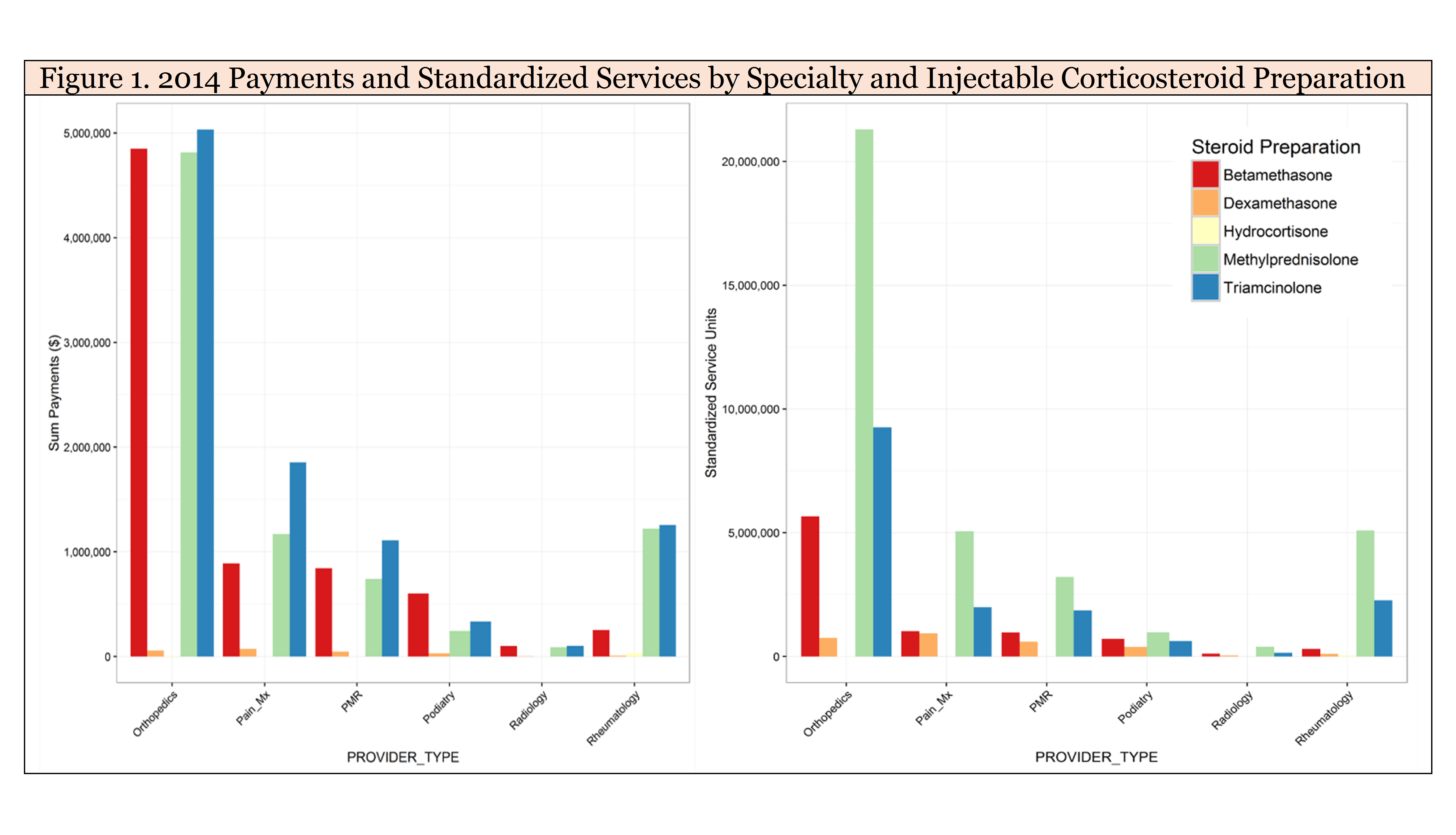Session Information
Session Type: ACR Poster Session C
Session Time: 9:00AM-11:00AM
Background/Purpose: Injectable corticosteroids (IC) are widely used for joint and soft tissue injections. Although four main types of preparations are available, there is sparse evidence and consensus for the selection and utilization of ICs. Using national outpatient Medicare data, we studied the utilization of IC preparations amongst musculoskeletal (MSK) care specialists.
Methods: A retrospective secondary analysis of Medicare physician and other supplier Public Use Files from 2014 were used for assessing injectable corticosteroids’ utilization. Non-duplicative billing claims for ten preparations of IC were calculated by MSK provider specialty and by State. MSK provider specialties were grouped into six groups that billed the majority of the services as shown in Table 1. Number of services submitted were standardized with Prednisone 5 mg to reflect unique doses. Cost per standardized service was then calculated. For national trends, injectable corticosteroids were aggregated to five main classes. Descriptive analysis was conducted using R-Studio (Version 0.98.1102) and Tableau (Version 9.3).
Results: Amongst the most commonly used ICs, methylprednisolone 40mg and 80mg preparations were cheapest and most commonly used preparations (Table 1). Triamcinolone 10mg and betamethasone preparations were the next most commonly utilized. Amongst these, betamethasone was more expensive and least used by Radiology and Rheumatology. Triamcinolone 1mg was the most expensive and was utilized mainly by the Pain Management. Moreover, Dexamethasone being the least expensive was also heavily utilized by the Pain Management. Hydrocortisone and triamcinolone diacetate were least utilized. Among MSK providers, Orthopedists had the highest utilization of IC, and Radiologists the least (Figure 1). In other words, Orthopedists showed the highest service counts as well as payments for IC use. When compared with other MSK specialties in the Top 10 states for national trends (Figure 2), Orthopedists were the dominant providers for total billing in these states, but Pain Management followed by Rheumatology had the most number of services per provider. In contrast to number of standardized service units, the highest payments were for betamethasone, methylprednisolone, and triamcinolone injectable corticosteroids.
Conclusion: This study highlights the disproportionate spending on certain types of injectable corticosteroids by MSK providers with no clear guidelines on their use. Variations between MSK providers in injectable corticosteroids types and dosage bespeak the need for additional research aimed at establishing uniform injectable corticosteroid use guidelines. There is a need for further trials investigating the comparative efficacy of different injectable corticosteroids with specific outcome measures to facilitate a more evidence-based practice.
To cite this abstract in AMA style:
Kaeley GS, Thway M, Dodani S. Injectable Corticosteroid Use in Musculoskeletal Care Specialties [abstract]. Arthritis Rheumatol. 2016; 68 (suppl 10). https://acrabstracts.org/abstract/injectable-corticosteroid-use-in-musculoskeletal-care-specialties/. Accessed .« Back to 2016 ACR/ARHP Annual Meeting
ACR Meeting Abstracts - https://acrabstracts.org/abstract/injectable-corticosteroid-use-in-musculoskeletal-care-specialties/



